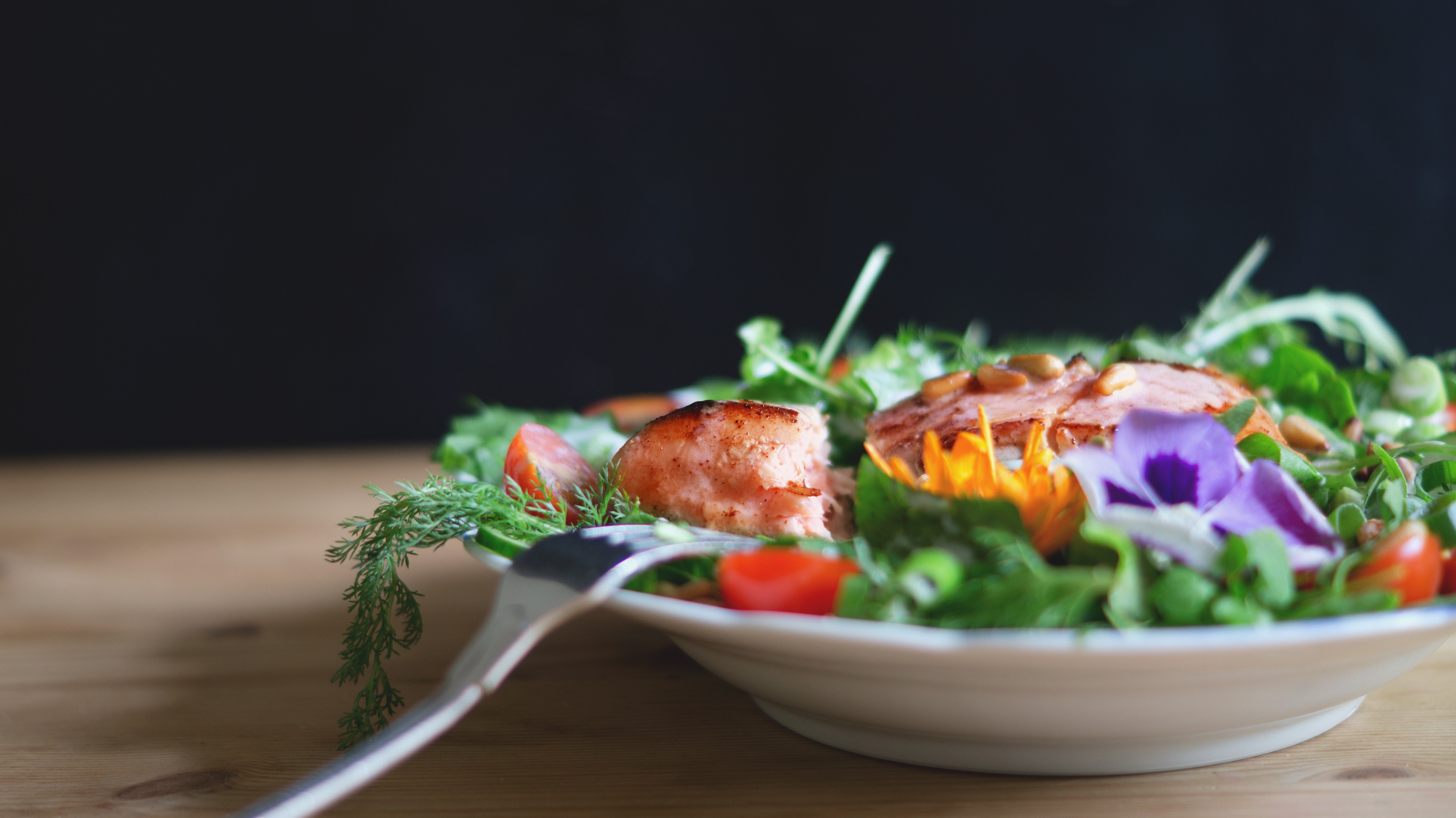Our mood affects our food choices but what we eat impacts on many parts of our lives including our weight, energy levels, health and it can also have an effect on our mood and mental health.
The collective combination of everything we eat and drink makes up our dietary pattern. Eating a well-balanced diet means our bodies will have all the nutrients they need for optimal health – and that includes our mental health too.
Eating well can have a positive impact on so many areas of our lives when we focus on eating a wide variety of nutritious foods every day.
The gut microbiome
Research is slowly revealing the role our gut microbiome can have on our overall health and is continually providing new information on ways in which we can promote its growth and diversity.
Our gut microbiome consists of tiny microorganisms or bacteria that live in our intestinal tract. Not only do they assist with digestion and nutrient absorption, but they also play a function in our health and wellbeing including metabolism, body weight, immune system, brain function and mood. Science is still uncovering the many ways our gut microbiome impacts of our lives.
The composition of our gut microbiome is mostly formed at birth, but it is impacted by many things, including our environment, stress, genetics, dietary intake and consumption of anti-biotics. Many of these influences are beyond our control, except for one: our dietary choices. What we choose to eat impacts on the composition of our gut microbiome, and we can modify this as we choose. A diet rich in fruits, vegetables and fibre is associated with a higher richness and diversity of the gut microbiota. That is because fibre-rich whole foods such as vegetables, fruit, whole-grains, legumes, nuts and seeds feed our gut microbiota. To have the greatest effect we need to eat these foods every day and ideally with every meal.
Probiotic supplements or foods consumed after taking antibiotics has also been shown to help restore the balance of the gut microbiome.
Exactly how the gut microbiome affects our overall health is still being discovered but it’s an area of development to keep an eye on.
Meeting your energy needs
To have the best chance of achieving optimal health and vitality, you need to provide your body with the right amount of energy or kilojoules so it can function appropriately. How much energy your body needs from food depends on your physical activity levels, how much of your day you spend sitting, your gender, body size and metabolism. There are calculators you can use to help estimate what your energy needs are if you are unsure.
Meeting your daily energy needs is important even though there’s often a lot of focus on dieting and weight loss in the media. With diets, especially fad diets, there’s often a focus on single foods or nutrients either as “miracle cure” or as something to be avoided. Diet culture can lead to feelings of inadequacy, binge eating and re-gaining weight again once the diet is over. The reality is that everybody is different and there is no ‘one quick fix’ or ‘magic diet’ that results in weight loss for every person. The only diet that is frequently recommended by medical professionals, particularly to those who suffer from heart disease is The Mediterranean Diet. This includes plenty of fresh fruits, vegetables, grains, nuts and fish and a limited intake of meat and dairy.
When we find ourselves reaching for a 3pm sugar hit, it’s usually because we haven’t eaten enough kilojoules throughout the day to fuel our body’s needs. When you eat a wide variety of nutritious foods in an amount sufficient for your needs, you’ll feel full of energy and won’t be left feeling hungry. Eat more than your body needs and it will be stored as fat.
The best approach you can take for weight loss is to eat a wide range of nutritious foods and engage in physical activity every day so that the total energy you consume is slightly less than what you need.
For example, a 40-year-old female weighing 80kg who does mostly sedentary work with little to no strenuous exercise would need 9,741kJ per day to maintain her current weight. In order to lose weight, reducing the intake by 2000 – 400 kJ has been shown to be most effective and has a higher long-term adherence than more restrictive diets.
Focus on the good
Drinking too much alcohol, smoking and consuming a lot of coffee, fatty foods and refined sugary foods and drink will often leave you feeling tired and lethargic. A diet that is higher in processed foods can also be more likely to lead to symptoms of depression and anxiety.
Rather than focussing on foods to cut out of your diet, it can be easier and more effective to instead focus on the good. Aim to have a healthy lifestyle that includes making positive choices for your health and wellbeing rather than placing all the focus on what you shouldn’t be doing. This can also help with feelings of shame or guilt around food as you begin to realise that individual nutrients or foods are not important, but your dietary intake as a whole is.
As a guide, The Australian Dietary Guidelines state that the key to eating well is to enjoy a wide variety of nutritious foods from each of the five food groups.
This includes plenty of vegetables of various colours, fruit, grains foods (mostly whole grain or high fibre cereal varieties, lean meat, poultry, fish, eggs, tofu, nuts, seeds, legumes, beans, milk, yoghurt, cheese or their alternatives).
Enjoying a wide variety of nutritious foods increases the likelihood that we will receive adequate nutrients from the foods we eat. This can help protect our bodies from chronic disease and improve the quality of our lives. Studies that have shown a link between diet and mental health have all been based on whole dietary patterns, not on specific foods or nutrients. Therefore, it is much more important to eat a balanced diet than focus on a single superfood or nutrient.
Most Australians eat only about half the recommended daily intake of vegetables, so that’s a great place to start. See if you can consume the recommended daily serves of vegetables every day for a week and see how it makes you feel (there’s information on what constitutes a serving size here). Also aim to drink more water as it will not only keep you hydrated but will also help you to feel more motivated, alert and productive throughout the day.
Eat a wide variety of healthy foods and exercise regularly in a way you enjoy, and you will be feeling your best in no time.
Eating well doesn’t need to be hard work
Including a wide variety of nutritious foods in your diet doesn’t need to be hard work. In fact, if we make it hard work, we’re less likely to do it. Make small incremental changes over time and see the difference these changes make to your life. Focus on making the task of eating for your health easy and effortless.
Here are some ways you can do it:
- aim to eat five serves of vegetables and two serves of fruit per day. Add fruit to your breakfast cereal and take some to work to snack on. Aim to include vegetables in lunch and dinner meals.
- use canned and frozen vegetables to help you reach your goal (they’re just as nutritious as the fresh kind and you’ll always have them on hand)
- try meal planning or food preparation routines where you freeze meals to consume later
- have plenty of convenient meals and snacks on hand so you don’t need to rely on takeaway or unhealthy food choices when you’re low on time or not feeling great
- switch out refined carbohydrates for wholegrain varieties – switch white rice for brown rice, white bread for wholemeal or multigrain and look for high fibre, low sugar cereal options.
Remember: it’s your overall food choices that make an impact, not single foods or nutrients. So, there’s no need to worry if you have an unhealthy food or snack on occasion. Focus on the good rather than trying to be restrictive with your food choices and move your body in a joyful way to give yourself the best chance of living a long and healthy life.
































